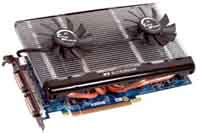 by congo » Tue Oct 26, 2004 9:14 pm
by congo » Tue Oct 26, 2004 9:14 pm
There is a bit of info coming out here, so I'll try to clarify it.
The Everest memory bandwidth benchmark is done in two parts seperately, read and write. My pic is the READ benchmark. My write was 1107 marks! Gixer ran both read and write, and you see by his results that there is a massive difference between my PC's memory bandwidth and his.
The CPU DOES HAVE AN EFFECT on the memory bandwidth benchmarks, as it is a measure of throughput, the CPU must process the data being transferred on the FSB. Any CPU variation would surely have an impact on the result. This could be verified by changing the multiplier on an AMD CPU and retesting. As my CPU multiplier is locked, I cannot verify this myself.
If I am full of it on this point, please set me straight.
Paul, the only mark I can verify is my own, as it is a test of actual THROUGHPUT on the FSB, as is, as set up. Any slight configuration change, such as RAM latency timings, will have an effect on the bandwidth. The test reads pure bandwidth and measures the amount of data that can be moved along the FSB over a time period.
The test doesn't particularly care how that data is moved, or the architechture used in doing it, and so it represents a fair comparison between different architectures / PC's.
(DDR, multiple pipes etc., do not matter, it's the end result that is measured here!)
The other systems listed are test results that Everest has listed for other PC configurations, and I would assume from the marks, (I have been studying these benchmarks through time and several updates to this type of software), that the systems tested are set up very well indeed, as I have a challenge matching their scores at standard clock settings.
I guess the reason for my post has been clarified, well, almost, as Gixer has the Socket 939 based 64bit platform, and the platform I wanted to see clarification on is the Socket 754 based system. From what I've read, there isn't a lot of difference between those two in actual performance.
From the above info, I can only assume that the 64bit MSI socket 754 mark in Everest is indeed in error. If there is anyone who has a socket 754 64bit machine, maybe they could run the test and post their results here.
Gixer, in the SiSoftSandra tests, you need to click the double blue arrow REFRESH button at the bottom to activate the test, you will then get your results and be able to compare them to the listed results.
Gixer's PR rating of his 64bit XP3500+ CPU is interesting, although perhaps he should run the CPU arithmetic test to consolidate the reading.
To me, this indicates a nasty trend for AMD CPU naming, in other words, they are giving indications of a higher P4 equivalency than they are actually capable of. The reverse has been true until recently, as AMD were actually under-rating them in my opinion.
I built a system this week using a new Thorton cored XP2600+ with 512mb L2 cache on chip. The new 2600+ benched noticeably lower than the older XP2600+ CPU's!
Last edited by
congo on Tue Oct 26, 2004 9:23 pm, edited 1 time in total.

Mainboard: Asus P5K-Premium, CPU=Intel E6850 @ x8x450fsb 3.6ghz, RAM: 4gb PC8500 Team Dark, Video: NV8800GT, HDD: 2x1Tb Samsung F3 RAID-0 + 1Tb F3, PSU: Antec 550 Basiq, OS: Win7x64, Display: 24&


 Mainboard: Asus P5K-Premium, CPU=Intel E6850 @ x8x450fsb 3.6ghz, RAM: 4gb PC8500 Team Dark, Video: NV8800GT, HDD: 2x1Tb Samsung F3 RAID-0 + 1Tb F3, PSU: Antec 550 Basiq, OS: Win7x64, Display: 24&
Mainboard: Asus P5K-Premium, CPU=Intel E6850 @ x8x450fsb 3.6ghz, RAM: 4gb PC8500 Team Dark, Video: NV8800GT, HDD: 2x1Tb Samsung F3 RAID-0 + 1Tb F3, PSU: Antec 550 Basiq, OS: Win7x64, Display: 24&






